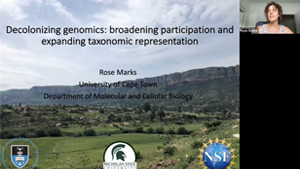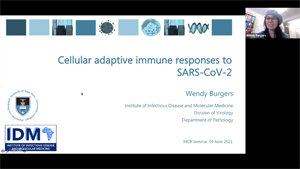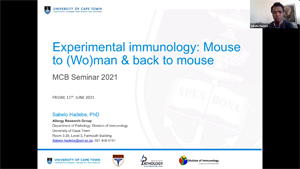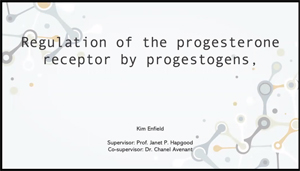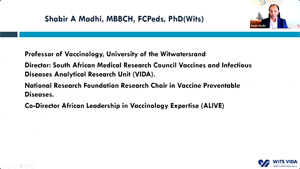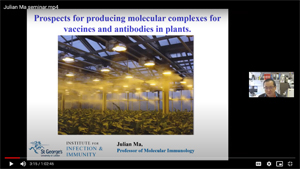The MCB seminar series is a wonderful resource for students and staff to discover the research of local and international researchers in molecular biology and associated fields. Recordings of their 2020 zoom presentations can be found below.
| Decolonizing plant genomics: broadening participation and expanding taxonomic representation | Dr Rose Marks Michigan State University; USA NSF's Plant Genome Program; MCB PASSCODE TO VIEW RECORDING: U2?eg+w! Dr Marks is a postdoctoral research fellow in the USA NSF's Plant Genome Program. She completed her PhD in 2019 from the University of Kentucky under the guidance of Dr Nicholas McLetchie. Currently, Dr Marks splits her time between Michigan State University (where she works with Dr Robert VanBuren) and The University of Cape Town (where she works with Prof. Jill Farrant). Her work centres around understanding adaptation to extreme water scarcity, with a particular focus on arid biomes in southern Africa. She uses both ecological and genomic approaches to investigate the mechanisms of desiccation tolerance in resurrection plants. You can read more about Dr Marks’ research at www.roseamarks.com. She is passionate about inclusivity, open science, and decolonizing botany. |
|
| Studies on immunity to SARS-CoV-2 | Assoc. Prof. Wendy Burgers Division of Virology & IDM, University of Cape Town PASSCODE TO VIEW RECORDING: TZKK^=R9 Wendy Burgers obtained her PhD from Cambridge University, UK. She is currently Senior Fellow of the European and Developing Countries Clinical Trials Partnership. She leads a research group of postgraduate students and postdoctoral researchers. The group usually focusses on understanding immunity in HIV-TB co-infection but, since the start of the Covid-19 pandemic, have switched to research on immune responses to SARS-CoV-2, through funding from the Wellcome Centre for Infectious Disease Research in Africa (CIDRI) and SA-MRC. |
|
|
Experimental allergic immune responses: Mouse to (wo)man and back to mouse | Dr Sabelo Hadebe |
|
| Regulation of the progesterone receptor by progesterones, antiretroviral drugs and the glucocorticoid receptor | Kin Enfield Dept Molecular and Cell Biology, University of Cape Town PASSCODE TO VIEW RECORDING: s?MQ=9vJ Kim completed her undergrad and honours degrees at MCB. She started her MSc in Prof. Janet Hapgood's lab in 2016 and after producing promising results, decided to upgrade her project to a PhD. Her research focusses on progestogens used in hormonal contraceptives (HCs) hormonal replacement therapies (HRTs) used globally by women. Importantly, the relative activity of some of the progestogens used in HCs and HRT has not been determined via their target steroid receptor, the progesterone receptor and its isoforms (PR-A and PR-B). Her thesis involves an in vitro investigation of some of the factors that affect PR activity and that may thus impact progestogen responses in women in HC or HRT. These include progestogen-specific effects via PR-A and PR-B, the role of antiretroviral drugs (ARVs) and crosstalk with the glucocorticoid receptor. |
|
| Covid-19 variants: Need for recalibration expectations of vaccines | Prof. Shabir Madhi Vaccines and Infectious Diseases Analytics Research Unit, University of the Witwatersrand PASSCODE TO VIEW RECORDING: heS^q$E1 Shabir A. Madhi is a Professor of Vaccinology in the School of Pathology at the University of the Witwatersrand and Director of the world-renowned Medical Research Council Vaccines and Infectious Diseases Analytics Research Unit (VIDA).He is an NRF A-rated Scientist and SARChI chair in Vaccine Preventable Diseases. As a trained paediatrician, Madhi's research has focussed on the epidemiology and clinical development of vaccines against pneumonia and diarrhoeal disease. These studies have informed World Health Organisation recommendations on the use of the life-saving vaccines in children and pregnant women. In 2016, Madhi received the European and Developing Countries Clinical Trial Partnership Award for Scientific Leadership and in 2013 the Medical Research Council Lifetime Award Platinum Medal, amongst other accolades. |
|
|
Prospects for producing molecular complexes for vaccines and antibodies in plants | Prof. Julian Ma |
|
| Exploring gene regulatory dynamics during development | Dr Dorit Hockman Division of Cellular, Nutritional and Physiological Sciences, University of Cape Town Dr Hockman received her undergraduate and MSc from UCT and her PhD from University of Cambridge. In 2013, she joined Trinity College (University of Oxford) as a Junior Research Fellow and began work on her current research into the evolution of the neural crest gene regulatory network. From 2016, she worked as a Leverhulme Trust funded post-doctoral researcher in the Sauka-Spengler lab at the Weatherall Institute of Molecular Medicine. During this period, Dorit also held the Sydney Brenner Post-Doctoral Fellowship, which allowed her to establish a new collaboration between the University of Cape Town, the University of Oxford and the California Institute of Technology. Dr Dorit Hockman was appointed as a lecturer in the Division of Cell Biology in 2018 and was awarded the Royal Society/African Academy of Sciences FLAIR fellowship in 2019. |
|
| Developing High-Throughput CRISPRi-based Functional Genomic Techniques for Mycobacteria | Timothy de Wet Institute of Infectious Diseases and Molecular Medicine, University of Cape Town Mr de Wet is a MBChB/PhD candidate at the Institute of Infectious Diseases and Molecular Medicine, University of Cape Town |
|
|
Coronaviruses: the good, the bad and the ugly | Prof. George Lomonossoff |
|
|
A rapid assay for SARS-CoV-2 mRNA detection which is non-mAb and non-PCR | Prof. Johannes Buyel |
For any seminar-related queries, please contact Dr Felix Dube.

